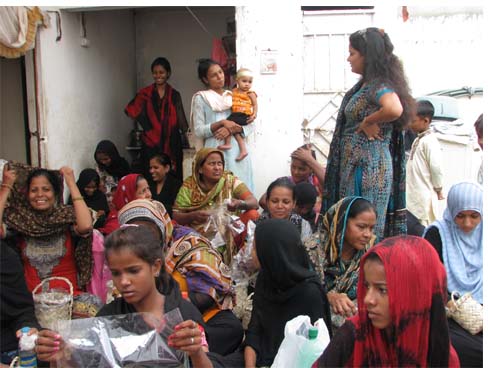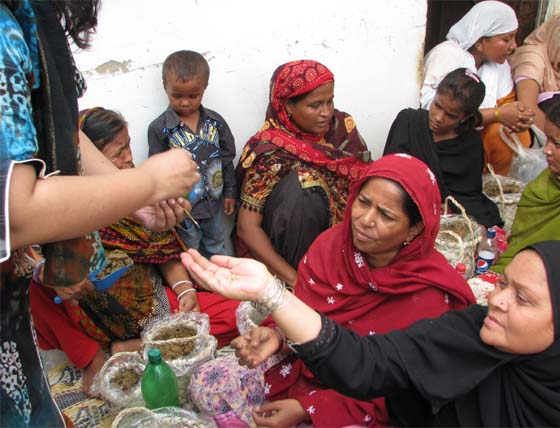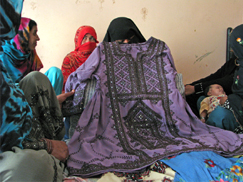By Deneb Sumbul
Working closely with women home-based workers in their homes was one of the most interesting undertakings I’ve ever been a part of, or worked in. It was Najma Sadeque’s Women’s Economic Empowerment project aiming to help one of the most economically exploited and marginalized women of the female work force in Karachi. It was her brainchild to arm these women with basic but crucial knowledge that will help impact their daily lives. Unfortunately towards the end, just when the project started showing outstanding as well as unanticipated results, Najma Sadeque passed away.

It was left to me to complete the project-end report as I was involved from the beginning, working voluntarily, documenting it for the entire duration of 2014. It took me to 15 goths/katchi abadis of Surjani Town, Korangi, Gulshan-e-Maymar, Sheedhi Goth and New Karachi. Essentially the 300+ women we had trained were women of limited means and mobility, living in restrictive environments. I got to see up close, under what circumstances they lived in, worked in and brought up their families, trying to make ends meet whether they were married, single, widows, divorced, separated, dependents or students. As an urbanite living in the other side of city going to areas deprived of basic amenities as well as considered risky and violent was quite the learning experience.
Every time we went to Haji Maro Sheedi Goth, we – my two team-mates, Nighat Taufiq, the gender-trainer, Kiran Majeed, doing documentation, and I — would return very nerve-wracked urbanites. We had unlovingly dubbed it the ‘Ghutka Goth’ because all the residents, including the smallest, seemed to be hung on the substance.
 “Ghutka Goth” (not the real name) was one of the first localities where we trained women home-based workers towards self-empowerment providing vital information they could affordably apply in their daily lives. I was supposed to photographically document the project, but ended up becoming a volunteer trainer as well, because another female trainer couldn’t be found, and the women refused – or would not be allowed — to be trained by a man.
“Ghutka Goth” (not the real name) was one of the first localities where we trained women home-based workers towards self-empowerment providing vital information they could affordably apply in their daily lives. I was supposed to photographically document the project, but ended up becoming a volunteer trainer as well, because another female trainer couldn’t be found, and the women refused – or would not be allowed — to be trained by a man.
My team-mates would take a deep breath and brace themselves every time our vehicle entered “Ghutka Goth”. We would quickly be mobbed by women and children of all sizes who’d tug at our clothes and follow us into the local schoolroom and cram themselves into every possible nook and cranny.

Initially, we put it down to excitement, but when we tried to decipher their shrilly introductions through the din of equally shrill children competing to be heard in the overcrowded room, we couldn’t. The same racket and atmosphere prevailed for most of the three months, and at the end of the day we would stop at some roadside shop for some very strong tea and aspirins. We were careful not to buy any from their local chai khanna as we discovered it was also laced with something addictive.
They were so unlike the other Sindhis we’d met elsewhere, because they were often aggressive to the point of being rude. They were also curious and friendly, but had wild mood swings. The women were constantly chewing on something, and often popping that same something into their children’s mouths. One day we even saw a young mother take some pre-chewed gunk from her own mouth and put it in that of her crying baby. It was ghutka ! She was giving it to keep him quiet, but the other women loudly piped in that it also kills hunger. Besides, they said nonchalantly, majority of men and women, even toddlers, took ghutka regularly. One tiny packet, the size of a shampoo sachet, cost Rs.10/- and most of them had a minimum of two, or as much as five, daily! It was safe to conclude they were all high – on a daily basis. — Not to mention the silent toll it was taking on their health.
 We felt they should be informed of the consequences of ‘ghutka’, so I downloaded a short video, and compiled a series of grisly photographs of fully-developed mouth cancers caused by ghutka, tobacco and ‘chalia’ (betel nut).We showed it to them at the next session. Most got a fright and some looked visibly ill. The good news was that many of them went cold turkey. After suffering from 10-day headaches, by the end of our course most of them had abandoned ghutka. Their skin cleared up, their teeth looked whiter, and they themselves looked cleaner.
We felt they should be informed of the consequences of ‘ghutka’, so I downloaded a short video, and compiled a series of grisly photographs of fully-developed mouth cancers caused by ghutka, tobacco and ‘chalia’ (betel nut).We showed it to them at the next session. Most got a fright and some looked visibly ill. The good news was that many of them went cold turkey. After suffering from 10-day headaches, by the end of our course most of them had abandoned ghutka. Their skin cleared up, their teeth looked whiter, and they themselves looked cleaner.
Most amazingly, their personalities had morphed into focused, attentive and appreciative women. Several grew more varieties of greens and started demanding different seeds to experiment with. Impact made. After that we showed the ghutka film at every location, and everywhere at least a few closet chewers emerged.
 The reformed “Ghutka Goth” women remained their lively selves, and were noisily upset when the course ended. They however insisted on introducing us to another group in the next goth a kilometer away, for the same course. We wondered how they could be friends, as temperamentally, they seemed to be their complete opposite.
The reformed “Ghutka Goth” women remained their lively selves, and were noisily upset when the course ended. They however insisted on introducing us to another group in the next goth a kilometer away, for the same course. We wondered how they could be friends, as temperamentally, they seemed to be their complete opposite.
In Mazar Khan Goth, the home-based workers were cultured and soft-spoken, had received some schooling, were skilled at crochet work on shawls and dupattas. A middleman would collect their efforts once a week, pay them a pittance and sell for a nice profit. They women also earned from selling milk from their own livestock. Once, their facilitator offered us tea which took almost an hour because the family cow had wandered off, and she had to send the kids to find it for fresh milk for our tea! The cow was a refrigerator of sorts. — They couldn’t store milk in the fridge because of long hours of loadshedding; often they’d be without electricity for two days in a row, sometimes for a week at a time.

The facilitator was the daughter of the local wadera (feudal lord) and she had offered her home for our sessions for the local women. — Very pleasant and easy to communicate with, except when it came to photography. The only time she allowed the camera was for taking photos of the leafy greens the women grew successfully.
It’s always bedlam at practical sessions, no matter which locality or community. One good lesson I learned from Ghutka Goth was to throw my voice. Instructions during demonstrations had to be shouted to be heard above the uproar, and we always ended up hoarse. This was mainly because additional women invariably turned up to add to the pandemonium – with their children too.

Sometimes there are more children than women, getting into everything. The most recent one was at Sindhi Hotel, a strangely named locality. The facilitator placed improvised shamianas at either end of the lane for some privacy. It simply attracted more attention, including of a drummer passing by.
Thinking it to be some sort of celebration such as a wedding or a child’s aqiqa, and obviously hopeful for a tip, he suddenly burst into the class, drumming with gusto. The women were aghast, and sprang up to thrash him for disturbing. The poor man fled, disappointed. The racket attracted even more of the neighborhood. It was only after class was over that everyone saw the funny side.

In Surjani Town where we trained women in several locations, Farida’s was the very first group. She and some others bring work from the factories and distribute it among the women. For attaching beads and sequins on each collar for a girl’s frock, women were paid Rs. 7/- a piece. The women later told us sadly they had seen their handiwork on frocks being sold in the market for Rs. 500/- to Rs. 700 each.
Halfway through their course, while most of the women proudly displayed their newly-grown greens, a few would be crestfallen when their chickens, or wild sparrows, or mice, ate theirs up before they could. Mice eat greens!?! We thought they ate grains.
 But what really alarmed us when one participant said a snake had made itself comfortable in her basket — which was how it got flattened. No one looked perturbed. We asked why. Sure, they said, poisonous earth-coloured snakes, scorpions, mice, frogs and pangolins were quite common. All three of us unconsciously look under our seats. The women were amused. All of them learned early how to deal with the local wildlife in underdeveloped barren land. There is no hospital nearby to deal with snake or scorpion bites, and there were surprisingly few mishaps considering how many of them had close calls.
But what really alarmed us when one participant said a snake had made itself comfortable in her basket — which was how it got flattened. No one looked perturbed. We asked why. Sure, they said, poisonous earth-coloured snakes, scorpions, mice, frogs and pangolins were quite common. All three of us unconsciously look under our seats. The women were amused. All of them learned early how to deal with the local wildlife in underdeveloped barren land. There is no hospital nearby to deal with snake or scorpion bites, and there were surprisingly few mishaps considering how many of them had close calls.
There were more disturbing stories as well – several participants from different groups were often beaten by their husbands, one so badly, she was unable to attend one of our sessions. There were whispers of a participant’s brother beating his wife — to the extent she swallowed pesticide and committed suicide. During our last sessions, yet another participant tried to take her own life when her husband decided she had become to independent for his taste, just because she was running a kiryana store from her home and she was pre-occupied looking after their five children and expecting their sixth.
During our sessions with them, invariably all the women voiced that rather than go to the police, they had no choice but to bear the worst, as they had no one or nowhere to fall back on. Going to court would only bring worse beatings.
 One of the happiest occasions that concluded a Korangi course, was a wedding. Sabrina was marrying the man next door for whom she had waited for five years. But her mother and sisters were against the match and refused to help financially. Her father lived elsewhere with his third wife, and couldn’t care less. Although all were equally poor, the kindly neighbours took on the responsibility of getting them married. Sabrina was an industrious and pleasant young woman, always the first to arrive in class, and so eager to learn. We really liked her.
One of the happiest occasions that concluded a Korangi course, was a wedding. Sabrina was marrying the man next door for whom she had waited for five years. But her mother and sisters were against the match and refused to help financially. Her father lived elsewhere with his third wife, and couldn’t care less. Although all were equally poor, the kindly neighbours took on the responsibility of getting them married. Sabrina was an industrious and pleasant young woman, always the first to arrive in class, and so eager to learn. We really liked her.
At the end of the last celebratory session, which was also the day of her engagement, she was presented with personal gifts of a dinner set, a jug and glass set, a trousseau of 6 full suits, and cash, from our team and Najma Sadeque. For a long while Sabrina was stunned and speechless. Then she wept saying her own family didn’t care about her happiness while complete strangers had done more than she had expected.
 All the concluding sessions ended the same way. A few weeks before the course end, the women would start counting the number of sessions left, and feeling sad.
All the concluding sessions ended the same way. A few weeks before the course end, the women would start counting the number of sessions left, and feeling sad.
 For these women, the sessions and trainings were also a window to the outside world and they desperately wanted to know about and learn more. All the 15 goths that they were from were within Karachi’s metropolis, sometimes at the very centre of highly congested localities. Hardly any services were available to these women such has proper health care or legal aid, sometimes even education for their children – and those that were available, they couldn’t afford. More than 1/3rd were unlettered. They endured long hours of load-shedding which effected their livelihoods and their health.
For these women, the sessions and trainings were also a window to the outside world and they desperately wanted to know about and learn more. All the 15 goths that they were from were within Karachi’s metropolis, sometimes at the very centre of highly congested localities. Hardly any services were available to these women such has proper health care or legal aid, sometimes even education for their children – and those that were available, they couldn’t afford. More than 1/3rd were unlettered. They endured long hours of load-shedding which effected their livelihoods and their health.


But the most satisfying feedback is knowing the impact we have made, “Bajji, aap aur phir nahi aygi?” (Won’t you ever come again?) and “Aap say hum nay itna seekha – zaroor aur bohot kuch hoga jo hum app say seek saktay hai. Zaroor wapus aie.” (We have learnt so much from you – surely there must be so much more we could learn. You must come back).”


Dear Deneb thanks a lot for sharing ,missing Najma and remembering her lovely soul . I had heard a lot about her but met her for the first time in Lahore at shirkatgah in a consultation meeting on HBWs national policy . She knew so much on the subject and was pleasure to listen to her with her sense of humor and authority on the subject . Thank you again Regards Asma Ravji Sent from my iPhone
>